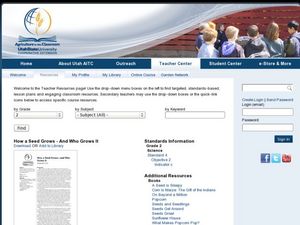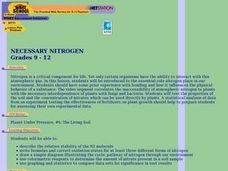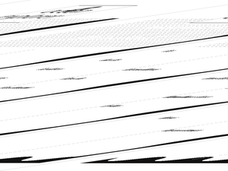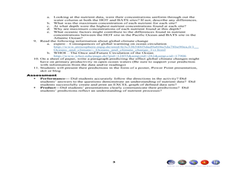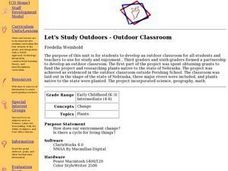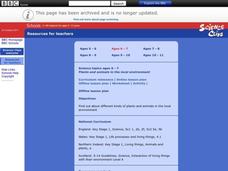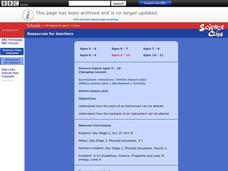Curated OER
Maintaining Strong Fisheries
Learners play a game about the life cycle of a blue crab in order to witness the causes of changes in the crab population and discuss what a resource manager could do to keep a stable crab population. Students then create a game titled...
Curated OER
The Many, Varied, and Unusual Places and Things on Earth
Students discover how energy flows through communities because of the relationship between producers, consumers and decomposers. Examining various ecosystems, they identify the materials that cycle continuously through them. They label...
Curated OER
How a Seed Grows and Who Grows It
First graders explore biology by viewing PowerPoint presentations in class. In this plant life lesson, 1st graders identify the life cycle of a plant and how to properly plant a seed outside. Students view a movie about plant life and...
Curated OER
A Seed Dispersal Investigation
Students investigate the function and purpose of seed dispersal. In this garden lesson, students examine the importance of wind in the plant cycle. Students construct a flying seed model from an attached design and discuss if it can be...
Curated OER
Necessary Nitrogen
High schoolers view a video that presents the biogeochemical cycle of nitrogen. They compare types of soils and consider how different fertilizers affect soil composition.
Curated OER
What is a Karst
Students investigate landforms by holding a class experiment. In this topography lesson, students define the word "karst" and discover why sinkholes are created on the surface of the Earth by completing worksheets. Students create a...
Curated OER
Bats and Hot Dogs
Students identify patterns and relationships from data that is collected and solve variables. In this investigative lesson students study ocean productivity, the nitrogen cycle and phytoplankton then answer questions.
Curated OER
Designing for Salmon and Steelhead
Sixth graders create designs for salmon habitats. They work in groups to design a tank habitat that mimics the requirements for salmon in various phases of its life cycle. Students may also raise salmon eggs as part of this unit.
Curated OER
Flower Reproduction
Fifth graders examine the cycle of flower reproduction. They listen to a poem about a bee, observe and examine flowers in small groups, and develop a class KWL chart. Students then read about flower reproduction in their textbook, and...
Curated OER
Let's Study Outdoors - Outdoor Classroom
Students research native plants. They identify the plant by scientific name, size, amount of water needed and color. Pupils measure and plot an area of school property. Students create an outdoor classroom. Additional cross curriculum...
Curated OER
Plants And Animals in the Local Environment
Pupils observe the various living things they can find outside their playground making sure to look both on the ground and in the air. They develop a large poster Venn digram, as a class, of plants and animals that live in the air, on...
Curated OER
Changing Sounds
Students identify how the pitch and the loudness of an instrument can be altered. In this online science of sound instructional activity, students employ the use of an interactive whiteboard to examine the loudness and pitch of a guitar,...
Curated OER
Changing State
Students investigate the cooling and heating of water. In this online science experiment lesson, students work in groups to make predictions regarding freezing and boiling points and then test those predictions as they complete the...
Curated OER
Growing Plants
Students explore plants and recognize that they are living things that require light and water to grow. In this online plant biology lesson, students identify, name and match the parts of plants. Extension activities and suggested...
Curated OER
Gases Around Us
Young scholars investigate gases and liquids. In this states of matter online activity, students examine how evaporation plays a part in the transition of liquids into gases as they watch a kettle of water boil and then work in small...
Curated OER
You're As Old As Ice!
High schoolers study glaciers and their terminology. In this investigative lesson students get into groups and watch the life cycle of a glacier on a web site then answer questions. They will then use play dough to show how glaciers...
Curated OER
The Solar System: Why do we Explore?
Third graders act as scientists. In this property discovery lesson, 3rd graders explore the substance "Oobleck" (cornstarch, water, food coloring). They work in groups to investigate the substance and make observations as a scientist...
Curated OER
What Do Plants Need?
Learners experiment with plants. In this plant lesson, students research the needs of plants. Learners determine if all plants have the same requirements for growth. In small groups, students experiment with different plants.
Curated OER
Regolith Formation
Students study what regolith is and how it contrasts with weathering on Earth. In this weathering instructional activity students divide into groups, hypothesize and confirm their guesses.
Alabama Learning Exchange
Plants, Soil and Nutrients
Young scholars conduct an experiment. They review how to use the scientific method to conduct an experiment with white carnations and food coloring. They create a hypothesis and test it to better understand how plants get nutrients,...
Curated OER
Sunflowers (Grades 3-8)
Students examine sunflowers and discuss the importance of sunflower cooking oil and seeds. They view pictures, read books, sing sunflower songs, and grow flowers from sunflower seeds.
Curated OER
Vocabulary: Kansas Prairies
Students explore the ecosystem by reviewing scientific vocabulary terms. In this environmental awareness activity, students identify the differences between abiotic and biotic factors and their relationship to the Earth. Students define...
Curated OER
Everyday vs. Extreme Relationships with Nature
Students examine the interactions with nature and the environment. They discover where water comes from and ways to conserve water. They also examine energy sources and consumption.
Curated OER
The Same but Different Part II
Third graders experiment with beakers of water and balloons to measure the volume of the gas in the balloon. They determine ways to change the volume of air in the balloon which changes its size but not its physical state. By heating the...
Other popular searches
- Water Cycle Diagram
- The Water Cycle
- Water Cycle Experiment
- Water Cycle Activities
- Water Cycle Stages
- Water Cycle Crossword
- Water Cycle Lesson Plans
- Water Cycle Reader's Theater
- Water Cycle and Evaporation
- Water Cycle Diagram Label
- Water Cycle Simulation
- Build Your Own Water Cycle




